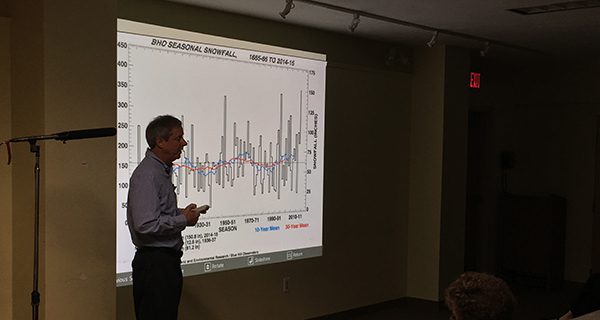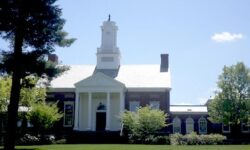[ccfic caption-text format="plaintext"]
By Katrina Margolis
Hometown Weekly Reporter
On Wednesday, Aril 26, the Friends of the Dover Council on Aging hosted the first of a series of four Lifetime Learning classes surrounding the topic of water. The overall series is “The Importance of Water Conservation: Are Our Wells Still Viable?” This first lecture was called “Your Drinking Water,” and took place at the Dover Library Community Room. John Thompson, who holds a degree in geology from the University of Maine and an MS in hydrogeology from the University of Rhode Island, spoke at length about how exactly the water systems work, especially in the Dover area.
At one point or another, everyone has seen a graph of the cycle of water: the sun heats up water in oceans and rivers, some of it evaporates into the air, some of it becomes water vapor, which then falls back into the oceans and rivers through runoff. Thompson explained this further in detail, especially regarding how exactly runoff works.
One of the most enlightening portions of his talk was his discussion of how long it takes for water sources to be replenished. There is a widespread fallacy that rain during one year makes up for drought in another. “It takes about three to five years in New England for an aquifer to come back to its natural point,” Thompson explained. That number is without human intervention, so in fact it takes even longer once humans start to interfere. “Almost all of the rain in the summer is used by plants, so Fall and Spring are the most important for recharging,” Thompson said. “When you start taking water out, it can take up to eight to 10 years instead of three to five to recharge.”
The series continued on May 3 with a lecture titled “Dover’s Water Resources,” led by Gerry Clarke, who is on the Dover Board of Health. On May 10, Peter Coppola, an engineer and certified master gardener will talk about “Outdoor Use.” This lecture will look at where water goes when it leaves the garden hose and steps one can take to reduce or improve use for the plants. The final lecture will be “Drought Tolerant Plants” on May 17. During the final presentation, Justine Kent, the executive director of the Upper Charles Conservation Land Trust, invites participants to her home where her own drought tolerant trees, shrubs and grass will be on display.

























